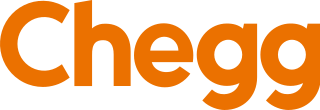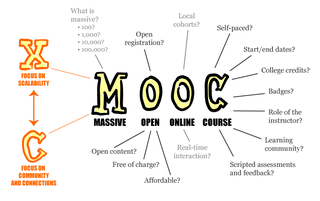
The College Board, styled as CollegeBoard, is an American not-for-profit organization that was formed in December 1899 as the College Entrance Examination Board (CEEB) to expand access to higher education. While the College Board is not an association of colleges, it runs a membership association of institutions, including over 6,000 schools, colleges, universities, and other educational organizations.
Electronic assessment, also known as digital assessment, e-assessment, online assessment or computer-based assessment, is the use of information technology in assessment such as educational assessment, health assessment, psychiatric assessment, and psychological assessment. This covers a wide range of activities ranging from the use of a word processor for assignments to on-screen testing. Specific types of e-assessment include multiple choice, online/electronic submission, computerized adaptive testing such as the Frankfurt Adaptive Concentration Test, and computerized classification testing.

The International General Certificate of Secondary Education (IGCSE) is an English language based secondary qualification similar to the GCSE and is recognised in the United Kingdom as being equivalent to the GCSE for the purposes of recognising prior attainment. It was developed by Cambridge Assessment International Education. The examination boards Edexcel, Learning Resource Network (LRN), and Oxford AQA also offer their own versions of International GCSEs. Students normally begin studying the syllabus at the beginning of Year 10 and take the test at the end of Year 11. However, in some international schools, students can begin studying the syllabus at the beginning of Year 9 and take the test at the end of Year 10.

An online school teaches students entirely or primarily online or through the Internet. It has been defined as "education that uses one or more technologies to deliver instruction to students who are separated from the instructor and to support regular and substantive interaction between the students. Online education exists all around the world and is used for all levels of education. This type of learning enables the individuals to earn transferable credits, take recognized examinations, and advance to the next level of education over the Internet.

Turnitin is an Internet-based similarity detection service run by the American company Turnitin, LLC, a subsidiary of Advance Publications.

Western Governors University (WGU) is a private, non-profit online university based in Millcreek, Utah, United States. The university uses an online competency-based learning model, providing advanced education for working professionals. Degrees awarded by WGU are accredited by the Northwest Commission on Colleges and Universities (NWCCU). The university was founded by 19 U.S. governors in 1997, after the idea was formulated at a 1995 meeting of the Western Governors Association to expand education offerings to the internet.
Vimeo, Inc. is an American video hosting, sharing, services provider, and broadcaster headquartered in New York City. Vimeo focuses on the delivery of high-definition video across a range of devices. Vimeo's business model is through software as a service (SaaS). They derive revenue by providing subscription plans for businesses and content creators. Vimeo provides its subscribers with tools for video creation, editing, and broadcasting, enterprise software solutions, as well as the means for video professionals to connect with clients and other professionals. As of December 2021, the site has 260 million users, with around 1.6 million subscribers to its services.

The Linux Foundation (LF) is a non-profit organization established in 2000 to support Linux development and open-source software projects.

Plagiarism is the representation of another person's language, thoughts, ideas, or expressions as one's own original work. Although precise definitions vary depending on the institution, in many countries and cultures plagiarism is considered a violation of academic integrity and journalistic ethics, as well as social norms around learning, teaching, research, fairness, respect, and responsibility. As such, a person or entity that is determined to have committed plagiarism is often subject to various punishments or sanctions, such as suspension, expulsion from school or work, fines, imprisonment, and other penalties.

Wix.com Ltd. is an Israeli software company, publicly listed in the US, that provides cloud-based web development services. It offers tools for creating HTML5 websites and mobile sites using online drag-and-drop editing. Along with its headquarters and other offices in Israel, Wix also has offices in Brazil, Canada, Germany, India, Ireland, Japan, Lithuania, Poland, the Netherlands, the United States, Ukraine, and Singapore.

Chegg, Inc., is an American education technology company based in Santa Clara, California. It provides homework help, digital and physical textbook rentals, textbooks, online tutoring, and other student services.

A massive open online course or an open online course is an online course aimed at unlimited participation and open access via the Web. In addition to traditional course materials, such as filmed lectures, readings, and problem sets, many MOOCs provide interactive courses with user forums or social media discussions to support community interactions among students, professors, and teaching assistants (TAs), as well as immediate feedback to quick quizzes and assignments. MOOCs are a widely researched development in distance education, first introduced in 2008, that emerged as a popular mode of learning in 2012, a year called the "Year of the MOOC".

Udacity, Inc. is an American for-profit educational organization founded by Sebastian Thrun, David Stavens, and Mike Sokolsky offering massive open online courses.

Coursera Inc. is an American global massive open online course provider. It was founded in 2012 by Stanford University computer science professors Andrew Ng and Daphne Koller. Coursera works with universities and other organizations to offer online courses, certifications, and degrees in a variety of subjects.
Grammarly is a Ukraine-founded cloud-based typing assistant, headquartered in San Francisco. It reviews spelling, grammar, punctuation, clarity, engagement, and delivery mistakes in English texts, detects plagiarism, and suggests replacements for the identified errors. It also allows users to customize their style, tone, and context-specific language.
Google Classroom is a free blended learning platform developed by Google for educational institutions that aims to simplify creating, distributing, and grading assignments. The primary purpose of Google Classroom is to streamline the process of sharing files between teachers and students. As of 2021, approximately 150 million users use Google Classroom.

Brainly is an education company based in Kraków, Poland, with headquarters in New York City. It is an AI-powered homework help platform targeting students and parents. As of November 2020, Brainly reported having 15 million daily active users, making it the world's most popular education app. In 2024, FlexOS reported Brainly as the #1 Generative AI Tool in the education category and the #6 Generative AI Tool overall. Also in 2024, Andreessen Horowitz reported Brainly as #6 in the Top 50 Gen AI Mobile Apps by monthly active users.

Synap is an intelligent online assessment and learning platform that uses the principles of spaced repetition to enhance long-term retention and accelerate learning. Spaced repetition has been shown to increase the rate of memorisation.
Artificial intelligence in education (AIED) refers to the application of artificial intelligence (AI) in education with the aim to facilitate, promote and support teaching and learning. It has garnered significant attention in the educational field due to its potential to revolutionize learning processes and improve educational outcomes. It encompasses various applications such as personalized instruction, intelligent tutoring systems, virtual mentors, adaptive learning systems, educational games, virtual reality simulations, and automated grading systems. The integration of AI in education aims to improve student engagement, provide customized learning experiences, and streamline administrative tasks for educators. UNESCO recognizes the future of AI in education as an instrument to reach Sustainable Development Goal 4, called "Inclusive and Equitable Quality Education".

Since the public release of ChatGPT by OpenAI in November 2022, the integration of chatbots in education has sparked considerable debate and exploration. Educators' opinions vary widely; while some are skeptical about the utility of large language models, many see them as valuable tools.














